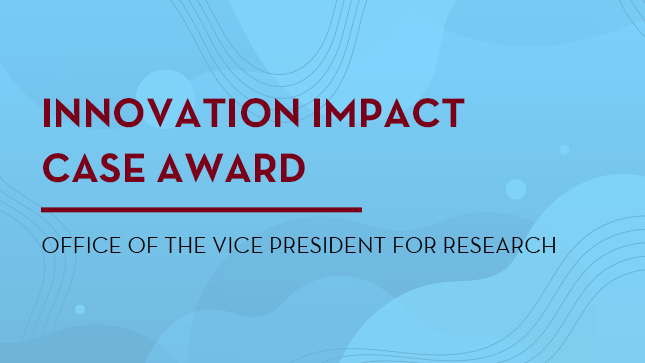
The Office of the Vice President for Research (OVPR) has announced the recipients of its inaugural Innovation Impact Case Award, which recognizes University of Minnesota research that has led to significant impact outside of academia.
"The Innovation Impact Case Award is the most prestigious award from the Office of the Vice President for Research," said Interim Vice President for Research Michael Oakes. "It shines a light on remarkable research across all disciplines that is solving important problems and benefiting society in a meaningful way."
Award Winners
The top prize of $10,000 went to two researchers/teams:
Swati S More and Robert Vince, Center for Drug Design, College of Pharmacy, for "Eye Imaging for Early Detection of Alzheimer's Disease"
Research led by Swati S More, PhD, associate professor, and Robert Vince, PhD, director, Center for Drug Design, has resulted in the development of a noninvasive, scalable tool for Alzheimer’s detection using the retina of the eye, without use of any extraneous dyes. Small-scale clinical studies have demonstrated safety and accuracy of this diagnostic to detect brain changes. This technology has pioneered the field of retinal imaging markers for Alzheimer’s detection. In partnership with a medical imaging company, RetiSpec, More and Vince are driving the translation of this method into clinical practice as part of a routine eye exam.

“We envision this scan as part of an annual eye exam and a tool for doctors to monitor changes in their patients.”
– Swati S More

“The eye is an extension of the brain. If we can see these plaques develop in the brain, maybe we can also see it in the eye.”
– Robert Vince
Read more: "Novel Retina Scan for Earlier Alzheimer’s Detection"
Sayan Biswas, Mechanical Engineering, College of Science and Engineering, for "Plasma Technologies for Clean Transportation"
Plasma igniters revolutionize the way fuels burn compared to conventional spark plugs. Adding $10 towards the total cost of an engine could lead to hundreds of dollars in fuel savings while producing zero emissions, leaving no carbon footprint. Sayan Biswas, PhD, the Benjamin Mayhugh Assistant Professor in Mechanical Engineering, and his research team at the UMN, in collaboration with Sandia National Laboratories, have developed an advanced low-temperature plasma igniter for automotive and aviation applications. Using plasma technology, an engine delivering 35 miles-per-gallon will achieve 60-70 miles-per-gallon with negligible pollutant emissions. Low-temperature plasma produces highly energized electrons and active radicals that improve fuel reactivity, opening up new chemical pathways inaccessible to conventional technologies.

“There is a simple solution to the problem [of climate change] - adopt technologies that produce fewer or zero greenhouse gases."
– Sayan Biswas
Read more: "A $10 Plasma Igniter Produces Zero Emissions and Doubles Fuel Economy"
Honorable Mentions
Five other researchers/teams received honorable mention for their projects:
- Greta Friedemann-Sánchez, Hubert H. Humphrey School of Public Affairs "Changing Colombia’s National Legislation Addressing Intimate Partner Violence"
- Nicholas Phelps, Minnesota Aquatic Invasive Species Research Center; Amy Kinsley, Veterinary Population Medicine, College of Veterinary Medicine for "Developing Data-Driven Decision Support Tools to Prevent the Spread of Aquatic Invasive Species in Minnesota"
- Emilie Snell-Rood, Ecology, Evolution, and Behavior, College of Biological Sciences for "Investing in Minnesota Roadsides as Green Infrastructure: Maximizing Benefits to Pollinators and Native Plants"
- Melissa A. Kenney, Institute on the Environment for "New Visualizations Improve the Understandability of Climate Outlooks Used by Millions of People"
- Pinar Karaca-Mandic and Soumya Sen, Carlson School of Management; Archelle Georgiou, Starkey Technologies for "University of Minnesota COVID-19 Hospitalization"
OVPR plans to offer the Innovation Impact Case Award annually in the fall and will continue to share stories about UMN research impact throughout the year.
“Since WWII, great American research universities have been the engine of scientific and cultural advancement,” said Oakes. “And in recent decades, our institutions have done a better and better job of leveraging our own breadth to advance innovation. But I think we can go further; our innovation can have more impact when we work to solve real world problems—with government, with communities, and with corporate partners. These award winners and honorable mentions are great examples of how academic researchers can take those next steps and how the University can better share the stories of impact.”
Learn more about the Innovation Impact Case Award: 2022 Awardees >